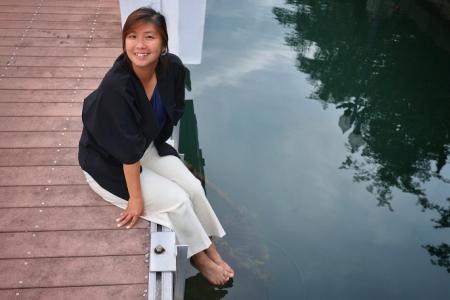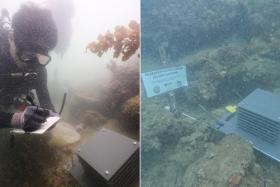‘Coral girl’ wants to bring the ocean closer to the heartland
After years of helping to restore Singapore’s coral reefs and clearing marine litter from the fragile habitat, marine biologist Sam Shu Qin now wants to take the country’s underwater wonders to the heartland.
Ms Sam, 35, formed a new non-profit group called Our Blue Spaces in March, which aims to make the less-visible marine life around the island-state more accessible to those who may not have had the chance to visit the nation’s biodiversity-rich Southern Islands, such as the Sisters’ Islands and Lazarus Island.
With the setting-up of the new outfit, Ms Sam plans to roll out creative programmes like “coral and cocktail” educational talks, marine-themed escape room games and dive expeditions, on top of conducting marine conservation sessions at firms and schools.
The aim, she told The Straits Times, is to bring the nation’s underwater environment to life for many Singaporeans who may not know about the richness of life in the country’s waters.
Despite their murkiness, Singapore’s seas are home to a rich variety of marine life, such as more than 100 species of reef fish, about 200 species of sea sponges, and rare and endangered seahorses and giant clams.
Ms Sam’s aspirations for Our Blue Spaces comes amid a “blue wave” in Singapore, with almost back-to-back announcements on ocean conservation rolled out over the past year.
These include the reopening of the Sisters’ Islands Marine Park in October, the September launch of the country’s first seagrass restoration project, as well as plans to create the country’s second marine park, which were announced in May.
The Friends of Marine Park community, a network of volunteers, had been involved in the proposal to designate a second marine park in the southern part of Lazarus Island and the reef off Kusu Island. Ms Sam is a coordinator of the Friends of Marine Park community.
About 60 per cent of Singapore’s reef area has been lost to land reclamation over the decades. Most of Singapore’s intact coral reefs are found in the Southern Islands, and plans are afoot to help restore some of these habitats.
In 2023, the country also announced a coral planting effort that will see 100,000 coral fragments being planted in degraded reef areas, among other suitable marine sites.
Ms Sam, an NUS College instructor, also wants young people to think more critically about Singapore’s marine spaces.
“A lot of students ask me: ‘Marine conservation, we only learn about animals, right?’ When you talk about the ocean, a lot of young people think only about ocean and fishing. But in Singapore, there are different challenges,” she said.
As an example, she pointed to the need to strike a balance between conservation and development, given the competing needs for Singapore’s limited sea space.
The marine community here is often involved in meetings with government agencies and other groups whenever there are proposed developments that may affect Singapore’s marine habitats. These could include a fish farm or a land reclamation project.
Ms Sam aims to equip her students with knowledge to contribute constructively to such meetings. She is also planning to set up a youth arm under the Friends of Marine Park community to nurture a younger generation of marine custodians.
Our Blue Spaces builds on a seven-year-old community group she co-founded called Our Singapore Reefs, which is focused on cleaning up coral reefs and raising awareness about the nation’s marine biodiversity.
With the help of diver volunteers, Our Singapore Reefs has cleared more than 11,000 pieces of rubbish from the local reefs since 2017, with finds ranging from plastic bottles to a Minnie Mouse plush toy.
The organisation also works with One°15 Marina in Sentosa Cove to maintain and plant corals at its coral garden patch. The other co-founder of Our Singapore Reefs is NUS lecturer Toh Tai Chong.
Ms Sam said: “The idea of setting up Our Blue Spaces is to partner with regional organisations, beyond Singapore and beyond reefs.” The new non-profit group was set up with Dr Toh and business development manager Yvonne Chang.
With the new non-governmental organisation, Ms Sam and her partners also plan to lend their expertise in coral restoration to other degraded reef sites in Indonesia and Timor-Leste, to protect larger tracts of marine ecosystems and improve locals’ livelihoods through ecotourism.
Get The New Paper on your phone with the free TNP app. Download from the Apple App Store or Google Play Store now


